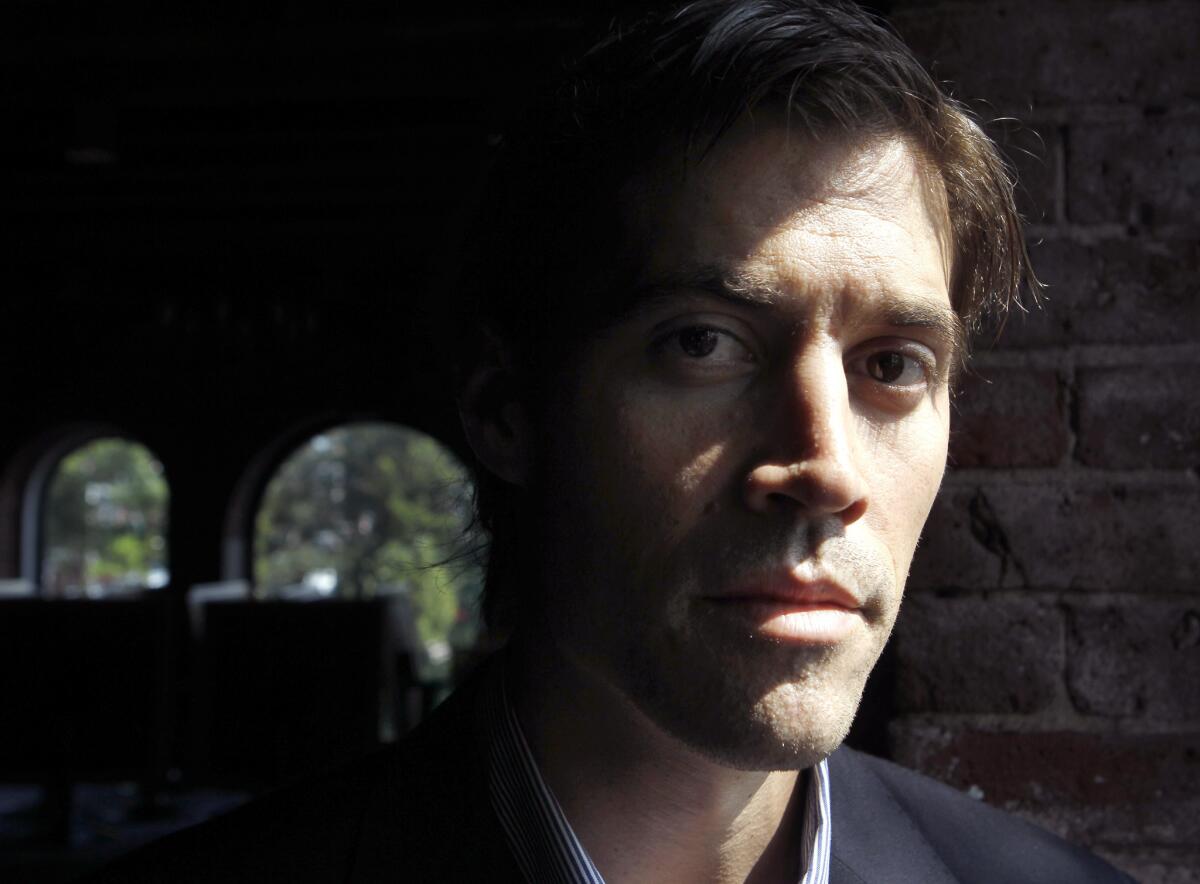U.S. no longer will prosecute families who try to pay ransom for hostages

Journalist James Foley in Boston in 2011. President Obama ordered an extensive review of hostage recovery practices after the beheadings last summer of Foley and fellow American journalist Steve Sotloff.
Relatives who try to pay ransom to free a family member being held hostage by terrorists will no longer face the threat of prosecution under a new policy from the Obama administration that seeks to streamline U.S. rescue efforts after several high-profile deaths.
President Obama plans to announce the new policy Wednesday as part of a broader set of guidelines on hostage crises, the result of a lengthy policy review. The overall goal is to coordinate the wide-ranging resources of the federal government to try to secure the return of American hostages, officials said.
The review is also an effort to deal more humanely with the panic-stricken families of abducted Americans, whose complaints about U.S. government handling of their cases have beset the Obama administration during a painful year that has seen notorious cases of abduction, threats and videotaped killings.
Families say they have received confusing messages from the government. One agency would threaten relatives with prosecution for talking about ransoms while another offered to facilitate such payments, for example.
The new policy also will keep the FBI in charge of managing hostage crises, despite the requests of families who believe the current structure fails to give negotiators enough power to operate.
The U.S. government will continue its long-standing policy of refusing to pay ransoms, senior administration officials said, or to negotiate with terrorists, as some European countries do.
“The resources of the United States government are not going to be used to make concessions to terrorists,” White House Press Secretary Josh Earnest said Tuesday, in the administration’s only public comments about the forthcoming policy. “We do not want to open the door to even more Americans being vulnerable to a hostage-taking.”
Critics charged that the changes don’t go far enough to solve long-running problems in the efforts to free Americans from captivity, including two dozen now held around the world.
“Wholesale changes are needed, but what’s being put forward is nothing more than window dressing, I fear,” said Rep. Duncan Hunter (R-Alpine), a Marine veteran and member of the House Armed Services Committee. “It’s a pathetic response to a serious problem that has plagued the ability of the U.S. to successfully recover Americans held captive in the post-9/11 era.”
Some family members of past and current hostages expressed concern about the plan to continue housing the bureaucracy at the FBI. Many had asked that the president appoint a hostage “czar” who reported to Obama and would have the authority to direct the Pentagon, State Department, FBI and intelligence networks as needed to coordinate rescue efforts.
Elaine Weinstein, whose husband, Warren, was a government contractor accidentally killed by a U.S. drone strike in Pakistan this year while being held hostage by Al Qaeda, said Tuesday that the information she and her family received in their 3 1/2-year ordeal was “inconsistent at best and utterly disappointing.”
She expressed concern about the decision to keep housing the hostage-rescue unit at the FBI. She said a better home would have been the president’s National Security Council, both to improve coordination and to “ensure that those debating counter-terrorism activities and hostage recovery efforts were sitting in the same room.”
“We hope to be the last family that fails to receive the level of coordinated government support that those who serve abroad deserve when trouble finds them,” she said.
Hunter said another issue with FBI leadership is that the bureau is not set up to rescue hostages in hostile areas. Even though the FBI official leading rescue efforts will have deputies from the Pentagon and State Department, he or she won’t have real authority to command them, he said.
The president’s team decided to keep the hostage recovery effort at the FBI because the infrastructure was already in place at the bureau, said a U.S. official, who agreed to discuss the details of the changes on condition of anonymity because the results of the White House review had not been publicly released.
Obama ordered an extensive review of the hostage recovery practices last fall, looking into how the government deals with the threats and with the families of hostages. It followed the searing images of the executions last summer of American journalists James Foley and Steve Sotloff, carried out and broadcast by Islamic State extremists.
Since then, the White House has slowly moved from staunch opposition to conversations about ransom between hostages’ families and kidnappers to a position that one administration official described as more humane.
As a result of the policy changes, families will not be discouraged from communicating directly with hostage-takers — a new flexibility that analysts said could have operational benefits.
“If you are open to communications, by definition you’re going to know more about what it is the hostage-takers want and what their bottom lines might be,” said Bruce Riedel, a former CIA official now at the Brookings Institution.
Also, if the new policy is seen as a clear White House directive, he said, that will give more power to the FBI official overseeing hostage rescue efforts.
The Office of the Director of National Intelligence will appoint a so-called issue manager for hostage affairs, charged with compiling information from different intelligence agencies and working to quickly declassify relevant details to provide family members and lawmakers with new information concerning a hostage, the U.S. official said.
Earnest acknowledged that improving communications with relatives was a high priority.
The changes do not come easily at the White House. Some advisors cautioned against giving families more latitude to discuss and pay ransoms out of fear that it would make Americans overseas more attractive to kidnappers.
“That’s a huge worry,” Riedel said. “That’s why they’re saying that the ‘no concessions’ rule will remain the policy of the United States.”
For news from Washington, follow @cparsons and @ByBrianBennett
More to Read
Start your day right
Sign up for Essential California for news, features and recommendations from the L.A. Times and beyond in your inbox six days a week.
You may occasionally receive promotional content from the Los Angeles Times.








